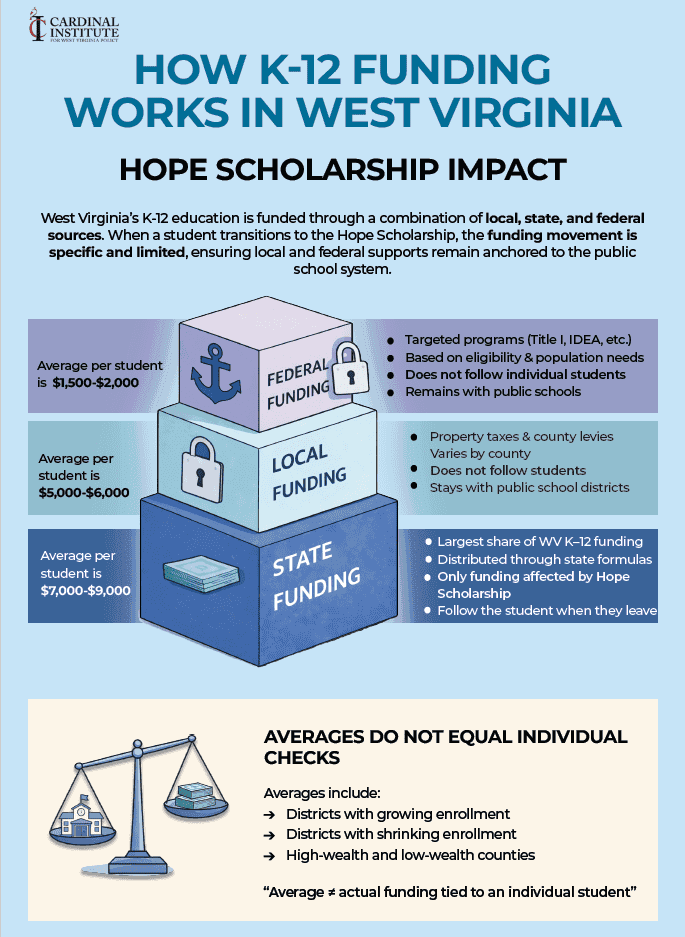
Hope Scholarship Rules Provide a Strong Foundation
Cardinal Team
Hope Scholarship Rules Are a Good Start
On April 18, 2022, the Hope Scholarship Board passed an amended version of the rules to govern the Hope Scholarship. These rules are governing the program as emergency rules, pending final approval by the state legislature. These rules are not perfect but they do provide an excellent foundation for the Hope Scholarship to thrive.
The Hope Scholarship program is an Education Savings Account (ESA). Eight states have ESA programs that give families a portion of the per-pupil cost in the state’s education budget. These programs allow families to tailor their child’s education by purchasing various pre-approved expenses. This program deals with public funds and is governed by rules established by the appropriate governing body. West Virginia’s ESA is governed by the Hope Scholarship Board. Their framework, though needing improvement, is a strong start.
Rules for Purchasing
The rules provide a wide array of qualified expenses for families to purchase with their funds. There are 18 pre-approved expenses with the possibility of the Board approving one that is not listed. These expenses are broad categories ranging from tuition and fees to basic supplies, such as pencils and paper. The wide range of qualified expenses allows a student to access the education services that they need. However, parents may only purchase products and services at pre-approved providers.
The need for pre-approved providers is causing some concern amongst parents. I have spoken with parents who have wondered if the Hope Scholarship Board will approve a specific provider that they use. There are around 50 schools who have already announced plans to participate in the program. Several national organizations, out of state schools, and private tutors are participating as well. There will be no shortage of providers because organizations like the Cardinal Institute, West Virginia Families United for Education, and Love Your School WV are recruiting providers every day.
Rules for Becoming a Provider
The process for becoming a provider is simple and straightforward. The program rules only require a provider to declare intent to participate and sign the provider contract. The approval process is intended to be easy so that a wide array of options for families is available. Once providers enroll, the Hope Scholarship Statute, HB 2013, gives providers autonomy in their instruction and educational activities. In order to become a provider, a school or organization must agree to abide by the rules of the program and not misuse funds.
Payment Processing
The process for payment is also giving some parents pause. Parents make all purchases through electronic transactions. All other ESA programs across the country do this. However, some states, like Arizona, utilize a debit card to purchase ESA expenses in addition to electronic transactions. Even with the absence of a debit card, which the legislature didn’t include to help reduce the possibility of fraud, the transaction process will be smooth for both providers and parents. Demonstrations from other states show that all parents need to do is log onto their portal, identify the provider(s) and service(s) they want to use, and direct the funds. With any new program, there may be some initial hiccups along the way. But, it is always within the best interest of the state and vendors to ensure that the program runs smoothly.
The Hope Scholarship Rules Are Not Final
The rules I am defending are not final and govern the program as emergency rules, which the state legislature needs to approve. Even as families, advocates, and lawmakers consider the rules and the program, one thing is certain. The rules of the Hope Scholarship Program help establish a strong foundation and framework for the success of the most expansive ESA program in the country.
Andrew Bambrick is the Education Outreach Coordinator for the Cardinal Institute for West Virginia Policy.







